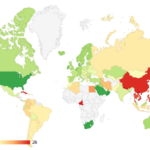During a recent Central Steering Committee meeting on housing, Prime Minister Pham Minh Chinh raised a critical question: “With apartment prices ranging from 70 to 100 million VND per square meter, who can afford to buy? Are you all living in the clouds?” This statement reignited concerns about the affordability crisis in Hanoi and Ho Chi Minh City, where housing costs far exceed the financial reach of most residents, particularly young families and workers.

According to the Ministry of Construction, the average apartment price in the first nine months of 2025 reached 75.5 million VND per square meter, a slight increase from the previous year and a staggering 87.7% higher than in 2019. The widening gap between income and housing prices has made the dream of “settling down” increasingly unattainable.
What Can Be Done to Curb Rising Apartment Prices?
A Bao Nguoi Lao Dong journalist interviewed Vo Hong Thang, a real estate expert and Deputy General Director of DKRA Group, to explore the factors driving the surge in apartment prices. The discussion also focused on effective solutions to control costs, ensure sustainable market development, and enable middle-income earners to own homes. This dialogue aims to provide insights into addressing Vietnam’s urban housing challenges.
Multi-Star Solutions: Real Estate Prices Remain Unyielding
Over the past two years, countless discussions have revolved around solutions for the real estate market, pinpointing various causes and proposing numerous measures. Yet, despite these efforts, housing prices remain stubbornly high, leaving many struggling to afford them. What explains this persistent gap between extensive dialogue and tangible results?
SHS Research: A Lifetime’s Journey—80 Years from Youth to Silver Hair, Yet the Door to Home Remains Elusive
According to a recent analysis report released on September 24 by SHS Research, housing prices in Vietnam are increasingly becoming out of reach for the majority of the population. To restore the housing market to a sustainable trajectory, it is essential to treat housing as a fundamental social welfare necessity. Maintaining reasonable home prices relative to income requires a significant increase in the supply of social housing, coupled with improvements in public infrastructure and services.













































